9 Jul 2018 | Index in the Press
As part of a discussion of the V&A’s new exhibition marking 50 years since the ending of theatre censorship, the Independent cites Index on Censorship work to support the play Homegrown, which was cancelled by the National Youth Theatre. Read the full article.
20 Jun 2018 | Artistic Freedom, Events
[vc_row css=”.vc_custom_1510749691901{padding-top: -150px !important;}”][vc_column][vc_single_image image=”96667″ img_size=”full” alignment=”center”][vc_column_text]
Risks, Rights & Reputations (RRR) is a half-day training programme developed by Index on Censorship, What Next? and Cause4 to provide arts and cultural leaders with the guidance, inspiration, tools and resources to navigate the rights and responsibilities of producing challenging or socially sensitive work.
Challenging a Risk Averse Culture
“In recent years there have been an increasing number of high-profile cases raising ethical and censorship issues around plays, exhibitions and other artworks. Censorship – and self-censorship – can stand in the way of great art. That’s why Arts Council England is committed to supporting those organisations who are taking creative risks. It’s important that organisations are aware of relevant legislation and the excellent guidance that exists. This programme is an important step in ensuring that our sector can continue to create vital, challenging, and risk-taking work.” – Sir Nick Serota, chair of Arts Council England
Navigating the rights and responsibilities of art that explores socially sensitive themes can appear daunting, risky and time-consuming. We have seen work cancelled or removed, because it was provocative or the funder controversial. But, for arts and culture to be relevant, dynamic and inclusive, we have to reinforce our capacity to respond to the most complex and provocative questions.
“This important and necessary project is a great opportunity to learn and discuss with others the increasing challenges we face in the arts sector, particularly in the context of socially engaged practise and public spaces.” – Mikey Martins, Artistic Director and Joint CEO, Freedom Festival Arts Trust
Session Content
The session addresses the challenges and opportunities related to artistic risk and freedom of expression. It aims to encourage participants to voice concerns and experiences within a supportive environment and programme of presentations, discussion and group work. By the end of day participants will:
- Understand the legal and rights framework supporting artistic freedom in the UK;
- Learn from analysis of recent controversies in the arts;
- Gain confidence in decision-making and planning for potentially controversial work;
- Manage expectations relating to the role of the police;
- Discover the value of creating an ethical fundraising policy;
- Benefit from access to new tools, resources and ongoing support from peers and experts beyond the session.
Participants
The session is open to artistic directors, CEOs, Senior management and trustees of arts organisations.
To date, RRR sessions have been delivered in Manchester, London and Bristol, with Arts Council national and regional offices and in partnership with the Freedom Festival Arts Trust, Hull.
“I feel more confident to speak up when talking to leaders about policy, process and practice when it comes to issues around artistic risk-taking / freedom of expression and ethical fundraising. I feel more empowered to be a useful, knowledgeable sounding board for the organisation’s I support than I did previously.” – Relationship Manager, Arts Council England[/vc_column_text][vc_separator][vc_column_text]
UPCOMING TRAINING
We are currently accepting bookings from CEO/Artistic Directors, Chairs, individual Board Members and senior team members across the country for our upcoming RRR training sessions:[/vc_column_text][vc_row_inner][vc_column_inner width=”1/6″][vc_column_text]Date[/vc_column_text][/vc_column_inner][vc_column_inner width=”1/6″][vc_column_text]ACE Region[/vc_column_text][/vc_column_inner][vc_column_inner width=”1/6″][vc_column_text]Venue[/vc_column_text][/vc_column_inner][vc_column_inner width=”1/6″][vc_column_text]Host[/vc_column_text][/vc_column_inner][vc_column_inner width=”1/6″][vc_column_text]Trainers[/vc_column_text][/vc_column_inner][vc_column_inner width=”1/6″][vc_column_text]Tickets[/vc_column_text][/vc_column_inner][/vc_row_inner][vc_row_inner][vc_column_inner width=”1/6″][vc_column_text]21 November 2018, 12:30 – 17:30 [/vc_column_text][/vc_column_inner][vc_column_inner width=”1/6″][vc_column_text]Midlands[/vc_column_text][/vc_column_inner][vc_column_inner width=”1/6″][vc_column_text]New Arts Exchange
Nottingham[/vc_column_text][/vc_column_inner][vc_column_inner width=”1/6″][vc_column_text]Skinder Hundal (CEO of New Art Exchange) and Sukhy Johal, MBE (Chair of New Art Exchange)[/vc_column_text][/vc_column_inner][vc_column_inner width=”1/6″][vc_column_text]Julia Farrington, Index on Censorship;
Helen Jenkins, Cause4;
Diane Morgan, director Nitrobeat[/vc_column_text][/vc_column_inner][vc_column_inner width=”1/6″][vc_column_text]From £25. Book tickets for New Arts Exchange session[/vc_column_text][/vc_column_inner][/vc_row_inner][vc_row_inner][vc_column_inner width=”1/4″][vc_single_image image=”103262″ img_size=”full”][/vc_column_inner][vc_column_inner width=”3/4″][vc_column_text]Host: Skinder Hundal, CEO, New Art Exchange [/vc_column_text][vc_column_text]
“Engagement, innovation and excellence are at the heart of New Art Exchange’s work. We are open and experimental in our programme and seek to represent a wide range of diverse cultural voices and tell sometimes difficult and unheard stories. The work that Risk, Rights and Reputations does to support cultural organisations in handling difficult subject matter is much needed.”
[/vc_column_text][/vc_column_inner][/vc_row_inner][vc_separator][vc_column_text]
The Team
“This was a really interesting, thought provoking, relevant and empowering session. I really appreciated the knowledge and the care taken to pull it together. Thank you!” – Participant – CEO
The RRR team consists of specialists and facilitators in freedom of expression, artistic risk and ethical fundraising alongside Artistic Director/CEO hosts who are committed to asking the difficult questions of our time:[/vc_column_text][vc_row_inner][vc_column_inner width=”1/3″][vc_single_image image=”103264″ img_size=”full” add_caption=”yes”][vc_column_text]Julia Farrington has specialised in artistic freedom, working at the intersection between arts, politics and social justice, since 2005. She was previously Head of Arts (at Index on Censorship (2009 – 2014) and continues her pioneering work on censorship and self-censorship as Associate Arts Producer. From 2014 – 2016, Julia was head of campaigns for Belarus Free Theatre. She now works freelance and is a member of International Arts Rights Advisors (IARA), facilitator for Arts Rights Justice Academy and Impact Producer for Doc Society, promoting documentary film as a powerful advocacy tool.[/vc_column_text][/vc_column_inner][vc_column_inner width=”1/3″][vc_single_image image=”103265″ img_size=”full” add_caption=”yes”][vc_column_text]Diane Morgan is the Director of nitroBEAT and a consultant/producer. She works in collaboration with artists, leaders and organisations to support (and merge) artistic risk taking and social engagement ideas, practices and approaches. Previous roles include; Project Manager for the Cultural Leadership Programme, Decibel lead for Arts Council West Midlands and Head of Projects at Contact Theatre, Manchester.[/vc_column_text][/vc_column_inner][vc_column_inner width=”1/3″][vc_single_image image=”103266″ img_size=”full” add_caption=”yes”][vc_column_text]Helen Jenkins is a consultant for Cause4, a social enterprise that supports charities, social enterprises and philanthropists to develop and raise vital funds across the arts, education and charity sectors. She has over 20 years experience of working across all fundraising disciplines in senior management and at Board level. Helen has helped organisations nationally and internationally to achieve fundraising targets and retain their ethics within challenging financial climates.[/vc_column_text][/vc_column_inner][/vc_row_inner][vc_separator][/vc_column][/vc_row][vc_row][vc_column][vc_column_text]
Booking Information
Fees
£45 for individuals from organisations with an annual turnover of over £500K.
£80 for two individuals from organisations with an annual turnover of over £500K
£25 for individuals from organisations with an annual turnover of over £250-500K
£40 for two individuals from organisations with an annual turnover £250-500K
Bursaries
Diversity and equality are essential to both the dialogue and learning around artistic risk-taking and for stronger a cultural sector. The programme is actively seeking to be fully representative of, reflect, and to meet the needs of the arts and cultural community across; gender, race, disability, sexual orientation, religion and class.
In order to respond to existing under-representation we are offering a limited number of bursaries to cover the training session fee for BAME and disabled CEO/Artistic Directors, Chairs, individual Board Members and Senior team members, and individuals from organisations with an annual turnover of under £250k who are currently living and working in England.
To apply for a bursary please write to: [email protected] with a short description of your organisation and why you would like to attend this session. Deadline: Friday 9 November.
Access
We aim to provide an inclusive environment and will work with individual participants to make sure we can meet your access needs, such as providing support workers or British Sign Language interpreters or preparing programme materials in alternative formats. Our experienced facilitators aim to be as flexible as possible in order to make the programme work for your particular needs. For access queries please write to [email protected][/vc_column_text][/vc_column][/vc_row][vc_row][vc_column][vc_column_text]
When: Wednesday 21 November 2018, 12:30–5:30pm
Where: New Arts Exchange, 39-41 Gregory Boulevard, Nottingham NG7 6BE
Tickets: From £25 via Eventbrite
[/vc_column_text][/vc_column][/vc_row]
8 Jun 2018 | Americas, Artistic Freedom, Awards, Cuba, Fellowship, Fellowship 2018, News and features
[vc_row][vc_column][vc_column_text]
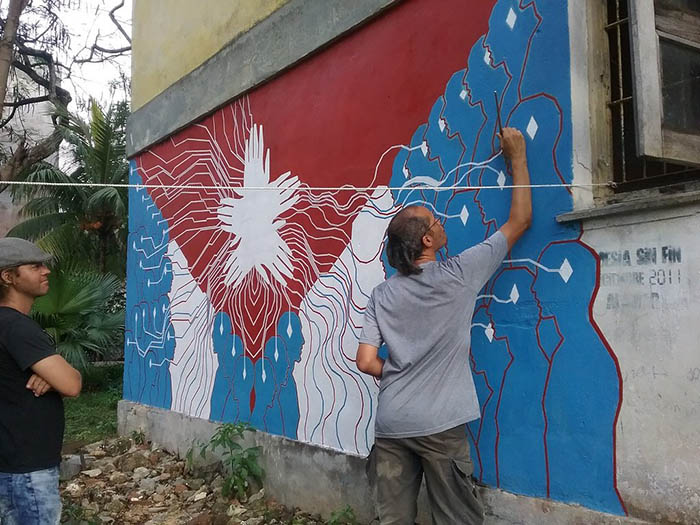
Cuban artist Yasser Castellanos
Despite official efforts to stop it in its tracks, Cuba saw the successful completion of its first independent art biennial, organised without the support of the state, on 15 May. Artist Luis Manuel Otero Alcantara and curator Yanelys Nuñez Leyva, members of the Museum of Dissidence, winner of the 2018 Index on Censorship Freedom of Expression Award for art, organised the ten-day #00Bienal de la Habana, which included over 170 artists, writers, musicians and theorists across nine different exhibitions in artists’ homes and studios around the country’s capital.
“Cuban culture is centralised culture and the government has absolute control,” Nuñez Leyva tells Index on Censorship. “The Ministry of Culture, together with all its branches such as the Union of Writers and Artists of Cuba and the National Council of Plastic Arts, are tentacles of the Ministry of the Interior, so all independent proposals, whether cultural, ecological or campaigns against gender violence, for example, are cursed with all the might of the government-controlled media.”
Even at schools pupils are served up propaganda intent on turning them against non-state-approved artists. Some art school students were shown a video portraying Otero Alcantara as a mercenary. “Such a campaign inevitably generates fear around independent projects which then suffer due to lack of both social and economic support,” Nuñez Leyva says.
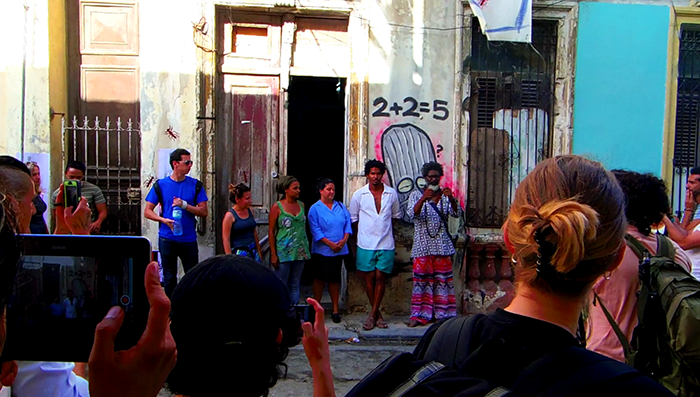
Economic support was one of the biggest obstacles for #00Bienal. “At the beginning, we thought that we would produce it with what we had at hand, but along the way we realised that we needed more,” Nuñez Leyva says. So a Gofundme campaign was set up, which raised $6,574. “But this wasn’t easy: the impact of the US blockade, our isolation from the world of networks and the impossibility of having credit cards made the process anguishing.”
Otero Alcantara was also imprisoned without cause on several occasions as part of the Cuban government’s campaign of harassment. Others who took part in #00Bienal, whether Cuban or foreign, received similar harassment. Many were even denied entry to the country, including the Cuban-American artist Coco Fusco.
When #00Biennial was announced in September 2017, the Cuban government immediately began to show its discontent through its cultural institutions. In an official declaration they branded the organisers as “unscrupulous people”. In response, #00Bienal’s first slogan was: “From the official to the unscrupulous.”
As culture is so tightly controlled in Cuba, only artists seen to be working in the interests of the regime can operate without restriction. Approved artists usually receive perks, something that gives them a higher status in society. Some artists risked all of this by taking part in #00Bienal. “The system used the worst blackmail against them because they gave the event a legitimacy that the government did not want,” Otero Alcantara says. “These artists were threatened by having their government accreditation taken away. Without this, they would find themselves without ‘official work’.”
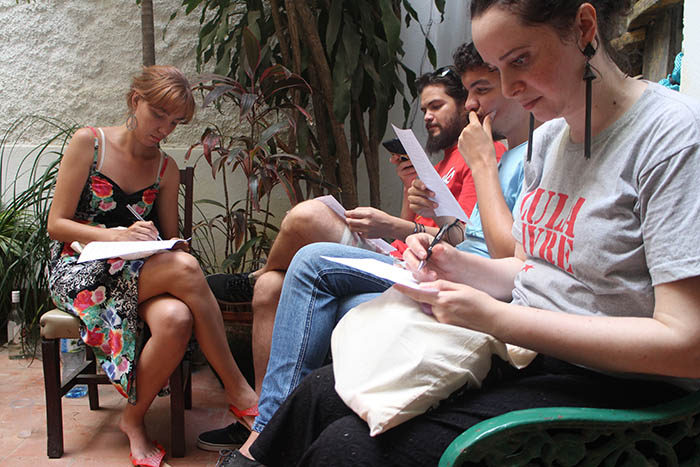
Government agents stalked the exhibitions while the organisers were accused of being in league with Cuba’s enemies. How does one respond to such accusations? “We responded by making an event that is as honest as possible, with a wide range of manifestations and artistic expressions that reflected the reality of Cuban art,” Nuñez Leyva says. “We responded with a list of more than 170 participants, not only Cubans, but from Mexico, Spain, Germany, the United States, Romania, Angola, Colombia, Denmark, Ukraine, Brazil, Venezuela, among them high-profile artists that Cuban institutions admire and collaborated with.”
The authorities even tried to prohibit the public from attending, sometimes successfully. Flyers and stickers were also confiscated. “But none of these actions were ever going to stop the energy of the event,” Otero Alcantara says.
“Despite all this pressure, the event went ahead, demonstrating that there is a group of people who are very courageous and have a real commitment culture,” Nuñez Leyva says. #00Bienal helped revive “a spirit of alternative rebellion” through the involvement of “countless numbers of totally unknown artists” that the state would never endorse.
For Otero Alcantara, the event’s success lies in the cohesion it created between artists, scholars and art enthusiasts, something that is unprecedented in the world of Cuban art. “We built an inclusive space of free creation and true collaboration between the people involved, exhibited the work of artists who were never going to have space in an official Havana Biennial and set a precedent for future projects,” he says. “This is one more step towards eliminating a fear that exists throughout Cuba.”
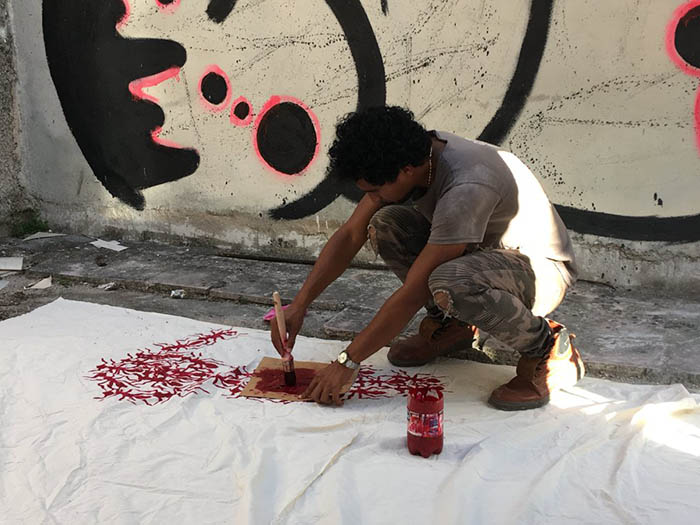
According to the organisers, the terms “revolution” or “revolutionary” have been hijacked and distorted by the Cuban regime. Such deformation has taken root so deep in the imagination of the Cuban people that just by mentioning the word “dissidence” is enough to be shunned, they explain.
“The #00Bienal was a humanistic project that brought to the fore essential values for any society such as unity, solidarity and collaboration,” Nuñez Leyva says. “The event also favoured the less privileged and created beauty and dialogue in favour of a new Cuba.”
The organisers of #00Bienal are under no illusions that life for Cuba’a dissident artists will magically become any easier under Cuba’s new president, Miguel Díaz‑Canel, who took over from Raúl Castro in April 2018. “The Cuban regime is more than any Castro,” Nuñez Leyva says. “It is a system based on a group of families that live both inside and outside the island, who have control over everything, which ultimately contributes to their own wealth.” This corrupt system relies on the deception of a people who have been left without even the strength even to protect themselves against poverty, she adds. “This situation leaves us with little hope, but we have to keep working.”
Otero Alcantara and Nuñez Leyva’s now want to show that #00Bienal wasn’t just a one-off, but is a serious project with longevity. “We will see if it is possible in two years to achieve something similar,” Otero Alcantara says.[/vc_column_text][/vc_column][/vc_row][vc_row][vc_column][vc_media_grid grid_id=”vc_gid:1528443291288-dfd45bff-0a16-7″ include=”100716,100712,100711,100710,100713,100709,100708,100707,100706,100704,100715,100705″][/vc_column][/vc_row][vc_row][vc_column][vc_column_text]
Artists, writers, musicians and theorists who took part in #00Bienal
Amaury Pacheco (Cuba), Iris Ruiz (Cuba), Coco Fusco (Cuba-USA), Tania Bruguera (Cuba), Reynier Leyva Novo (Cuba), Ernesto Oroza (Cuba), Gerardo Mosquera (Cuba), Katherine Bisquet (Cuba), Jose Ernesto Alonso, Yuri Obregón (Cuba), Alein Somonte (Cuba), Alejandro Barreras (Cuba), Anaeli Ibarra (Cuba), Alejandro Taquechel (Cuba), Ariel Maceo Tellez (Cuba), Aryam (Cuba), Aldeide Delgado (Cuba), Armando Cuspinera (Mexico), Antonio Mas (Spain), Alicia Torres (Spain), Ana Olema (Cuba), Alexis Ruiseco (Cuba-USA), Alexandru Raevschi (Germany), Andrés X (Cuba), Alain Aspiolea (Cuba), Alexandre Arrechea (Cuba), Antoni Muntadas (Spain), Biennial Project (USA), Boris González Arenas (Cuba), Colectivo Corason i uevo (Antonio A. Orta, Maykel Almenteros y Pedro Pablo Bacallao) (Cuba), Colectivo Guerrillas Girls, Celia y Yunior (Cuba), Colectivo 2.50 (Ana Gómez, Argelia Leodegarío, Marco Antonio Rodríguez, Itandehuitl Orta, Yuvia Pérez, Esmeralda Pérez) (Mexico), Carlos Manuel Álvarez (Cuba), Clara Astiasarán, Chu (Cuba), David de Omni, David León (Cuba), Danilo Maldonado (El Sexto), Diego Gil (Spain), Eliecer Jiménez Almeida (Cuba), Erish (Mexico), El Oficio (Cuba), Ernesto Hernandez Busto, Enfori García, Filipa César (Portugal), Fabián (2+2 =5) (Cuba), Francis Sánchez (Cuba), Francisco Méndez (Mexico), Francisco Masó (Cuba), Fabian Martínez, Filio Gálvez, Fredric Snitzer, Gabriel Coto (Cuba), Gerardo Stübing (España), Gean Moreno, Henri Eric Hernández (Cuba), Hamlet Lavastida (Cuba), Héctor Trujillo (Cuba), Hugo Patao, Italo Expósito (Cuba), Iván de la Nuez (Cuba), Jesús Hdez-Güero (Cuba), Jesús Benítez (Mexico), José Luis Marrero (Cuba), Josvan Gonzalez Agramonte (Cuba), Julián Yunda Yepes (Mexico), Jenifer Acuña (Cuba), Juan Melo (Colombia), Juan Carlos Alvarez Miranda (Cuba), Jean-Lorin Sterian (Romania), José Bedia (Cuba), Julio César Llopiz (Cuba), Javier Marimón, José Manuel Mesías (Cuba), Keyezua (Angola), Kevin Arrow, Lía Villares (Cuba), Luis Trápaga (Cuba), Luiso, Leandro Villanueva (Sam 33) (Cuba), Lester Dubé (Cuba), Lala Misosniky (Romania), La Alianza (Cuba), Liliam Dooley, Leandro Feal (Cuba), Lourdes Porrata, Miquel García (Spain), Marisol Maza (Mexico), Marcel Marquez (Cuba), Marianna Liosi (Germany), MO colectivo (Mariam Abrajim y Octavio Salazar) (Colombia), Magdiel Aspillaga, Mysora García, Nonardo Perea (Cuba), Natalia López (Colombia), Osmel Almaguer Delgado (Cuba), Osmany Carratalá (Cuba), Oscar Salamanca (Colombia), Orlando Hernández (Cuba), Pablo Pinto (Colombia), Polyanna Morgana (Brazil), Political Architecture: Critical Sustainability (PA:CS) (Denmark), Peter Menéndez, Rafael Carabano (Venezuela), Raúl Meriño (Cuba), Ras Yoe, Ricardo Figueredo, Rodolfo Peraza (Cuba), Rafael Domenech, Rirkrit Tiravanija, Svitlana Biedarieva (Ukraine), Soandry del Río (Cuba), Sandra Ceballos (Cuba), Santiago Alvarez Méndez (Colombia), Sandor (Cuba), Thiago Morandi (Brazil), Tomás Sánchez (Cuba), Tomas Vu, Tonel (Cuba), unx Pardo Ibarra (Colombia), Ulises Valdés (Mexico), Walfrido Valera (Cuba), Yaima Pardo (Cuba), Yasser Castellanos (Cuba), Yesica Suárez (Colombia), Yulier P. (Cuba), Yoenis Eloy Mayeta (Cuba), Yimi Konclase (Cuba), Yvelin Buenrostro (Mexico), Yucef Merhi (Venezuela), Yornel Martínez (Cuba), Yali Romagoza (Cuba), Yanier H. Palao (Cuba).[/vc_column_text][/vc_column][/vc_row][vc_row][vc_column][vc_basic_grid post_type=”post” max_items=”4″ element_width=”6″ grid_id=”vc_gid:1528443291296-0ad2c295-a239-7″ taxonomies=”104″][/vc_column][/vc_row]
5 Jun 2018 | Artistic Freedom, News and features, Turkey
[vc_row][vc_column][vc_column_text]
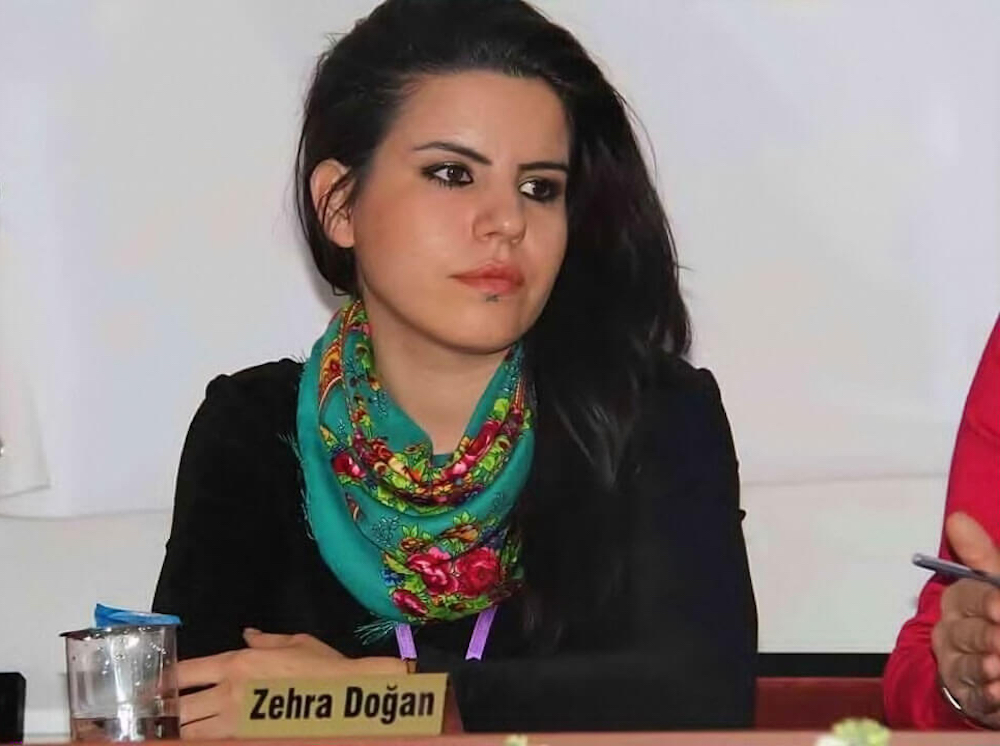
Kurdish artist and journalist Zehra Doğan
The last time Onur Erem and his girlfriend Zehra Doğan, a Turkish artist and journalist, met face-to-face, she was chirpy and seemed happy, he recalls. They sat at a picnic table and talked about her art being concurrently exhibited in various places around the world, from New York to Europe. They were surrounded by other families, busily conversing amongst each other at the picnic tables to their left and right.
But this was no picnic. Two prison guards walking up and down the aisle in between two rows of tables screwed to the concrete floor, eyeing the prisoners and their families with forced indifference masking wariness, made sure no one lost sight of the fact.
“She was in good spirits,” Erem says, attributing it to her continuing to create art while in prison, just like she did on the outside, before her sudden arrest as she was awaiting the outcome of the court case against her on charges of spreading propaganda in favour of a terrorist organisation.
“She writes down the stories of the people she met there. Since there’s not much in terms of the supplies on the inside, she uses the dyes that she makes from food. They don’t give her canvass, so she draws either on clothing or envelopes from the letters she receives. She collects the bird feathers that fall in the prison yard and makes improvised brushes out of them,” he explains.
The reason for Doğan’s incarceration was the drawing she made while covering the Turkish military operation in the town of Nusaybin on the border with Syria, populated mainly by Kurds. The drawing was made based on the photograph that had previously been circulated widely by the Turkish military on social media, according to press reports and Erem. The point of contention is whether the original photograph did or did not include the flags of the Turkish Republic hanging from buildings half-destroyed during the operation.
“She drew a military vehicle in the form of a scorpion. I’d say, this was her only addition to the photograph itself,” he says explaining that the military vehicle his girlfriend depicted in such a manner is referred to as “Akrep”, the Turkish word for a scorpion. “However the judge, in spite of all the evidence presented, sided with the opinion that the photo was taken by Zehra herself, that the original photo didn’t contain the Turkish flags hanging from the destroyed buildings and that [she] added them on for propaganda purposes, and thus, by way of this picture she was engaged in a propaganda on behalf of a terrorist organisation.”
Boxing the art
The widely-shared narrative is that Erdogan lashed out against artists after the July 2016 coup attempt. However, his government had gone after scores of artists and their freedom of artistic expression much earlier, of which Doğan is but one example. Two years after the coup, the crackdown doesn’t seem to dissipate, and the arrest of Turkish rapper Ezhel on inciting drug use in his songs on 24 May 2018 being the latest occurrence.
Attacks on artists across Turkey range from firing of one of the country’s most prominent orchestra conductors İbrahim Yazıcı for his criticism of the Erdogan government, to decapitating Ankara University’s theater department by dismissing Tülin Sağlam, its head and five other senior professors critical of the authoritarianism; from arrests of popular cartoonists, such as Cumhuriyet newspaper’s Musa Kart, to handing down a 10-months sentence against Zuhal Olcay, one of the country’s most popular singers and actresses.
The limitation of artistic freedoms is clearly a trend in Turkey, says Julie Trebault, Director of Artists at Risk Connection, an artistic freedom non-profit based in New York, adding that while in the past two years the attacks have escalated, they’d started before the coup attempt.
Years in the making
“We have several cases, for example, the case of the two filmmakers who have released their film, Bakur in 2015. Bakur was screened at many festivals in Europe for a couple of months without being censored or attacked. And then, in 2015, at the 34th Istanbul film festival, just hours before the premiere, the film got censored,” she recalls, explaining that the film was a documentary about the PKK, a Kurdistan Workers’ Party that is considered a terrorist organisation by the government of Turkey.
As to the persecution of artists even before the coup, Trebault adds “When Erdogan became president, things went down and down and down in Turkey. It took years to arrive where we are in Turkey [now]”.
Turkish filmmaker Elif Refiğ sees the roots and the reasons for the persecution of artists in the Gezi Park protests of 2013. “There had been a very serious oppositional sentiment that had collected in the society until then, that failed to organise until that moment. A very important feature, it included artistic institutions, and its nature was very creative to the extent that it changed the very definition of ‘disobedience’,” she says. According to her, it was a completely peaceful campaign spearheaded by arts institutions that didn’t tolerate violence, and it spread all over the country.
Refiğ points out that in addition to arrests, torture and jailings as ways for the state to punish the disobedient artists that often meet the eye, there are other ways of applying pressure: “The economic obstacles make the lives of the artists miserable. Blacklisting. It makes it difficult for the people to find work, impedes their freedom of movement.” As the case in point, she cites Füsun Demirel, popular television and cinema actress who has been struggling to find work for the past three years because “she is a Kurd, and because she openly voiced her opinions.”
As harmful as it is for the arts in Turkey, the crackdown on the freedom of artistic expression has also affected the general public, Trebault says.
“There’s definitely more self-censorship. People tend to get less out about those issues. People tend to be extremely careful on what they are saying,” she adds.
Responding to a question about the public’s reaction, Refiğ says that, although, the general public is critical, “Where would the criticism from the society be coming from? At this point, all television channels, all newspapers have been silenced by the forces in power.” She explains that multiple ongoing court cases against the media outlets are having a chilling effect on the public.
While the Turkish society is succumbing to self-censorship and its artists are fighting to get out their artistic word amid incarceration and repressions, the international community is struggling with possible solutions.
International support coming too late
“In my personal opinion, the international support is coming to Turkey too late,” says Refiğ. She explains that some international institutions like Pen America or Amnesty International are doing their best to call the international attention to the ongoing crisis with the freedom of expression in Turkey, while others, “institutionalised international organisations,” as she terms them, such as the E.U. and the Council of Europe, for instance, have their own pressing concerns-not letting the mass influx of refugees from the conflicts in the MENA region to cross into their borders, and, therefore, desperately needing the co-operation of the Turkish government.
“At very critical points, when they shouldn’t have restrained their words, they stood by our government, as they were afraid of the opening of the borders [by Turkey] and a free movement of Iraqi and Syrian refugees to Europe” she says of the international institutions. “Hypocrisy is the word that even might come to one’s mind. Words-wise, there’s a lip service to improving the human rights situation in Turkey, but action-wise, there’s very little acting upon it, unfortunately.”
Trebault, on the other hand, says Turkey, as a member of various international bodies is a signatory to important international human rights treaties, and Western governments should call on its government to abide by them.
Grim prospects, great expectations
Looking into the future, Trebault says she doubts things will get better in the next few years in Turkey.
“In 2017 the referendum gave even more power to the president,” she says of the plebiscite that effectively abolished the parliamentary system existing at the time and replaced it with the presidential system with a much stronger executive. “So, to be honest with you, I don’t think there will be changes for the better with this government,” she says.
Back in Diyarbakır’s E-type maximum security prison, while counting days until her release, Doğan is also pondering her future.
Making plans for after her release upon completing her two-and-a-half-year sentence next February, Erem says Doğan plans to continue working on her art, as well as her work as a journalist. “Currently, there’s an exhibit of her artwork In France that includes paintings and drawings smuggled out of the prison, as well as her previous work. This draws the attention of the artistic community, as well as the society at large, that’s why she wants to continue.”
He says that his girlfriend is also taking notes while in prison that she’s planning to use for writing a book when she is out.
“Of course, the solidarity that she sees on the outside also helps a lot. [It] helps her and her jailed friends to keep their spirits high, as they see that their voices are heard on the outside and there are quite a few people who don’t want to leave their side.”[/vc_column_text][/vc_column][/vc_row][vc_row][vc_column][vc_basic_grid post_type=”post” max_items=”4″ element_width=”6″ grid_id=”vc_gid:1528275200044-7774f8c3-7f31-3″ taxonomies=”8607″][/vc_column][/vc_row]





